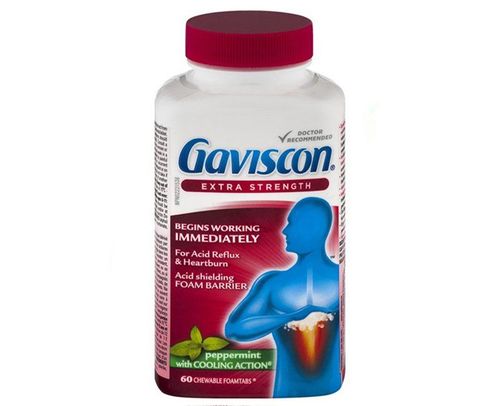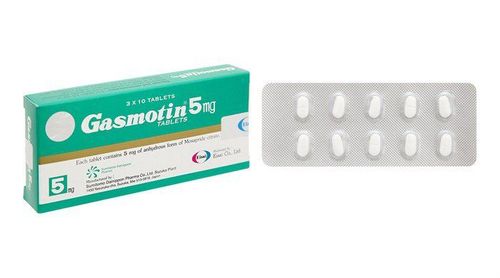This is an automatically translated article.
The article is written by Master, Doctor Mai Vien Phuong - Gastroenterologist - Department of Medical Examination & Internal Medicine - Vinmec Central Park International General Hospital.Gastroenteritis (an infection of the intestines or stomach) can have many of the same symptoms as Crohn's disease. Therefore, these two diseases are often confused with each other. So, how to distinguish Crohn's disease from gastroenteritis?
1. What is the stomach?
The stomach is an organ located in the upper abdomen between the esophagus and the small intestine. The stomach performs the following functions:Receiving and crushing food. Destroy harmful external agents. AIDS digestion. Sends a signal to the brain when you're full. The stomach helps prevent infection by secreting an acid from its lining, which acts on harmful bacteria and viruses found in the food you eat. The small intestine absorbs most of the nutrients you consume. Meanwhile, the stomach helps break down amino acids and absorb simple sugars, such as glucose. The stomach also breaks down some medications, such as aspirin. The valve at the base of the stomach regulates the amount of food that enters the small intestine.

2. Causes of stomach pain
Swelling (inflammation) of the lining of the stomach and intestines is characteristic of gastroparesis. Sometimes, it is caused by a virus or it can also be caused by a parasite or bacteria such as salmonella or E. coli.In some cases, an allergic reaction to a certain food or irritation can cause stomach upset. This discomfort can be caused by consuming too much alcohol or caffeine, eating too many fatty foods, or simply eating too much.
3. What is Crohn's disease?
Crohn's disease is an ongoing (chronic) condition that causes the gastrointestinal (GI) tract to become inflamed. Crohn's can occur in many areas of the digestive tract. For example:Small intestine. Mouth. Esophagus. Colon. Anus . Crohn's disease can cause abdominal pain but is also more likely to cause other related symptoms, including:
Diarrhea . Weight loss. Tired. Anemia. Athritis.

4. Symptoms related to stomach pain
Stomachache. Nausea (with or without vomiting). Increase intestinal motility. Loose stools or diarrhea. Headache. Body aches. Chills (with or without fever).5. Symptoms of Crohn's
Symptoms of Crohn's disease usually develop gradually. Some symptoms may become more severe over time. Although it can happen, it is rare for Crohn's symptoms to come on suddenly and unexpectedly. The earliest symptoms of Crohn's disease may include:Diarrhea. Constriction in the abdomen. Blood in your stool. Fever. Tired . Eat well. Weight loss. Feeling as if your bowels aren't empty after a bowel movement. Have a frequent need to have a bowel movement. Sometimes, you can mistake these symptoms for symptoms of another condition; such as food poisoning, stomach upset or allergies. You should see your doctor if any of these symptoms persist.
Symptoms may become more severe as the condition progresses. More severe symptoms may include:
A perianal fistula causing pain and discharge near your anus. Ulcers can occur anywhere, from the mouth to the anus. Arthritis and skin. Shortness of breath or reduced mobility due to anemia. Early detection and diagnosis can help you avoid serious complications and get early treatment.

6. Conventional Treatment for Stomach Problems
Fortunately, most cases of abdominal pain can be treated without a visit to a doctor. Treatment should focus on fluid supplementation and dietary management. You may also need antibiotics, but only if the pain is caused by certain bacteria.6.1. Clear Liquids For adults, the University of Wisconsin-Madison recommends a liquid diet for the first 24 to 36 hours of abdominal pain accompanied by nausea, vomiting, or diarrhea. Make sure to drink plenty of water, sports drinks or other clear liquids (2 to 3 liters per day). You should also avoid solid foods, caffeine, and alcohol.
If you are vomiting, wait 1 to 2 hours before drinking water. You can suck on shaved ice or popsicles. If you tolerate this, you can switch to other clear liquids (including non-caffeinated drinks), such as:
Ginger soda. 7-Up. Decaffeinated tea. Water used in. Diluted juice (apple juice is best). Avoid citrus juices like orange juice. 6.2. Food Try to eat bland foods if you tolerate clear liquids. Includes:
Toasted white bread. Boiled potatoes. Rice. Apple sauce. Banana. Yogurt with live cultured probiotics. Cheese. Lean meat, like skinless chicken.

The American Academy of Family Physicians says adults can resume a normal diet if symptoms improve after 24 to 48 hours. However, avoid certain foods until your digestive tract heals. This process can take one to two weeks. These foods include:
Spicy foods. Dairy products (milk and cheese). Whole grains and other high-fiber foods. Vegetables. Oily food. Caffeine and alcohol. 6.3. Treatment with acetaminophen can control symptoms such as fever, headache, and body aches. Avoid aspirin and ibuprofen as they can further irritate the stomach.
In adults, over-the-counter bismuth subsalicylate (such as Pepto-Bismol) or loperamide hydrochloride (such as Imodium) may help control diarrhea and loose stools.
7. When to care about stomach pain
Most symptoms of abdominal pain will subside within 48 hours if you stick to the above treatment regimen. If your symptoms don't go away, you likely have Crohn's or another disease.You should consult a doctor if any of the following symptoms accompany abdominal pain:
Abdominal pain that does not improve after bowel movements or vomiting. Diarrhea or vomiting that lasts more than 24 hours. Diarrhea or vomiting more than three times per hour. Fever above 101°F (38°C) does not improve with acetaminophen. Blood in stool or vomiting. Do not urinate for six hours or more. Heart palpitations, nervousness. Inability to pass gas or have bowel movements. Purulent discharge from the anus.

8. Conclusion
relapse or continue without warning. Weight loss, diarrhea, and abdominal cramps can also occur in Crohn's. If you have persistent symptoms, see your doctor. Never self-diagnose chronic symptoms. Although there is no cure for Crohn's disease, it can be managed with medication and lifestyle changes. Talking to like-minded people can also help you a lot in your treatment.Please dial HOTLINE for more information or register for an appointment HERE. Download MyVinmec app to make appointments faster and to manage your bookings easily.














